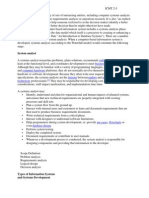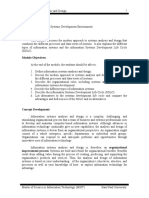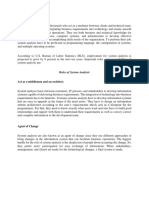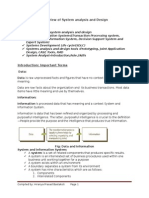The Modern Systems Analyst: The Chapter Will Address The Following Questions
The Modern Systems Analyst: The Chapter Will Address The Following Questions
Uploaded by
iremyildizCopyright:
Available Formats
The Modern Systems Analyst: The Chapter Will Address The Following Questions
The Modern Systems Analyst: The Chapter Will Address The Following Questions
Uploaded by
iremyildizOriginal Title
Copyright
Available Formats
Share this document
Did you find this document useful?
Is this content inappropriate?
Copyright:
Available Formats
The Modern Systems Analyst: The Chapter Will Address The Following Questions
The Modern Systems Analyst: The Chapter Will Address The Following Questions
Uploaded by
iremyildizCopyright:
Available Formats
The Modern Systems Analyst
Introduction
The chapter will address the following questions:
What is the systems analysts role and responsibilities in the modern business? Why are organizations recruiting computer end-users to partner with the traditional systems analyst? What are the roles of systems analysts and business users in systems problem solving? Where are the career opportunities for systems analysts? Who are the systems analysts customers and partners in systems development?
The Modern Systems Analyst
Introduction
The chapter will address the following questions:
What business trends and drivers are influencing the careers of systems analysts? How can you prepare yourself for a career as a systems or business analyst? What does the future hold for systems analysts?
The Modern Systems Analyst
Who Should Read This Book
What is an Information System?
An information system is an arrangement of people, data, processes, interfaces, networks, and technology that interact for the purpose of supporting and improving both day-to-day operations in a business (sometimes called data processing), as well as supporting the problem solving and decision making needs of management (sometimes called information services). A computer application is computer-based solution to one or more business problems and needs. One or more computer applications are typically contained within an information system.
What is a Computer Application System?
The Modern Systems Analyst
Who Should Read This Book
The Systems Analyst - A Key Resource
Many organizations consider information systems and computer applications as essential to their ability to compete or gain competitive advantage. Information has become a management resource equal in importance to property, facilities, employees, and capital. All workers need to participate in the development of these systems and applications not just the computer and information specialists. But one specialist plays a special role in systems and applications development, the systems analyst. A systems analyst(s) facilitates the development of information systems and computer applications.
4
The Modern Systems Analyst
Who Should Read This Book
The Systems Analyst - A Key Resource
The systems analyst performs systems analysis and design. Systems analysis is the study of a business problem domain for the purpose of recommending improvements and specifying the business requirements for the solution. Systems design is the specification or construction of a technical, computer-based solution for the business requirements identified in a systems analysis. (Note: Increasingly, the design takes the form of a working prototype.).
The Systems Analyst As A Modern Business Problem Solver Why do businesses need Systems Analysts?
The Modern Systems Analyst
The system analyst bridges the communications gap between those who need the computer and those who understand the technology.
The Systems Analyst As A Modern Business Problem Solver What is a Systems Analyst?
The Modern Systems Analyst
Systems analysts are people who understand both business and computing. Systems analysts study business problems and opportunities and then transform business and information requirements of the business into the computer-based information systems and computer applications that are implemented by various technical specialists including computer programmers.
The Systems Analyst As A Modern Business Problem Solver What is a Systems Analyst?
The Modern Systems Analyst
A formal definition: A systems analyst facilitates the study of the problems and needs of a business to determine how the business system and information technology can best solve the problem and accomplish improvements for the business. The product of this activity may be improved business processes, improved information systems, or new or improved computer applications frequently all three.
The Systems Analyst As A Modern Business Problem Solver What is a Systems Analyst?
The Modern Systems Analyst
When information technology is used, the systems analyst is responsible for: the efficient capture of data from its business source the flow of that data to the computer the processing and storage of that data by the computer the flow of useful and timely information back to the business and its people Information technology is a contemporary term that describes the combination of computer technology (hardware and software) with telecommunications technology (data, image, and voice networks).
The Systems Analyst As A Modern Business Problem Solver What is a Systems Analyst?
The Modern Systems Analyst
A systems analyst is a business problem solver. A systems analyst helps the business by solving its problems using system concepts and information technology. A systems analyst sell business management and computer users the services of information technology. A systems analyst sells change.
10
The Systems Analyst As A Modern Business Problem Solver What is a Systems Analyst?
The Modern Systems Analyst
The role of systems analyst is changing into two distinct positions or roles, business analyst and application analyst. A business analyst is a systems analyst that specializes in business problem analysis and technology-independent requirements analysis. An application analyst is a systems analyst that specializes in application design and technology-dependent aspects of development. A synonym is system or application architect.
11
The Systems Analyst As A Modern Business Problem Solver What Does A System Analyst Do?
The Modern Systems Analyst
A system analyst is a system-oriented problem solver. System problem solving is the act of studying a problem environment in order to implement corrective solutions that take the form of new or improved systems. Most systems analysts use some variation of a system problem solving approach called a system development life cycle. A systems development life cycle (SDLC) is a systematic and orderly approach to solving system problems.
12
The Systems Analyst As A Modern Business Problem Solver What Does A System Analyst Do?
The Modern Systems Analyst
The SDLC usually incorporates the following general-purpose problem solving steps: Planning - identify the scope and boundary of the problem, and plan the development strategy and goals. Analysis - study and analyze the problems, causes, and effects. Then, identify and analyze the requirements that must be fulfilled by any successful solution. Design - if necessary, design the solution not all solutions require design. Implementation - implement the solution. Support - analyze the implemented solution, refine the design, and implement improvements to the solution. Different support situations can thread back into the previous steps.
13
The Modern Systems Analyst
Obsolete solution Planning Problem to be solved
Related problem to be solved Support Analysis
Implementation error to be fixed Implemented solution Implementation Acceptable solution
New solution to same problem Problem analysis and Solution requirements
Design
14
The Systems Analyst As A Modern Business Problem Solver What Does A System Analyst Do?
The Modern Systems Analyst
System analysts are responsible for other aspects of a system including: PEOPLE, including managers, users, and other developers and including the organizational behaviors and politics that occur when people interact with one another. DATA, including capture, validation, organization, storage, and usage. PROCESSES, both automated and manual, that combine to process data and produce information. INTERFACES, both to other systems and applications, as well to the actual users (e.g., reports and display screens). NETWORKS, which effectively distribute data, processes, and information to the people.
15
The Systems Analyst As A Modern Business Problem Solver Where Do System Analysts Work?
The Modern Systems Analyst
Systems analysts can be found in most businesses; however, the organization of information services in many businesses is in turmoil as those businesses reorganize to improve service, quality, and value.
16
The Systems Analyst As A Modern Business Problem Solver Where Do System Analysts Work?
The Modern Systems Analyst
The Systems Analyst in the Traditional Business. Information services are centralized for the entire organization or a specific line of business.
Information Services reports directly to chief executive officer, or the chief executive for a line of business. The highest ranking information officer is a vice president, sometimes called a chief information officer (CIO).
17
The Systems Analyst As A Modern Business Problem Solver Where Do System Analysts Work?
The Modern Systems Analyst
The Systems Analyst in the Traditional Business. Information Services is organized according to the following functions or centers:
Systems and Applications Development. Most systems analysts work here, along with most programmers. The systems analysts and programmers are organized into permanent teams that support the information systems and applications for specific business functions. The Systems and Applications Development unit may include a development center. A development center establishes and enforces the methods, tools, techniques, and quality of all development projects.
18
The Systems Analyst As A Modern Business Problem Solver Where Do System Analysts Work?
The Modern Systems Analyst
The Systems Analyst in the Traditional Business. Information Services is organized according to the following functions or centers: (continued)
Data Administration This center manages the data and information resource in the organization. Data Administration usually employ several systems analystlike specialists called data analysts who analyze database requirements and design and construct the corresponding databases.
19
The Systems Analyst As A Modern Business Problem Solver Where Do System Analysts Work?
The Modern Systems Analyst
The Systems Analyst in the Traditional Business. Information Services is organized according to the following functions or centers: (continued)
Telecommunications This center designs, constructs, and manages the computer networks that have become integral to most businesses. Network analysts perform many of the same tasks as applied to designing local and wide area networks that will ultimately be used by systems and applications.
20
The Systems Analyst As A Modern Business Problem Solver Where Do System Analysts Work?
The Modern Systems Analyst
The Systems Analyst in the Traditional Business. Information Services is organized according to the following functions or centers: (continued)
End-User Computing This center supports the growing base of personal computers and local area networks in end user community. They provide installation services, training, and help desk services (call-in help for various PC related problems). In mature businesses, they also provide standards and consulting to end users who develop their own systems with PC power tools such as spreadsheets and PC database management systems. In this latter role, they employ analyst-like end user computing consultants.
21
The Systems Analyst As A Modern Business Problem Solver Where Do System Analysts Work?
The Modern Systems Analyst
The Systems Analyst in the Traditional Business. Information Services is organized according to the following functions or centers: (continued)
Computer Operations This center runs all of the shared computers including mainframes, minicomputers, and non-departmental servers. This unit rarely employs systems analysts.
22
The Modern Systems Analyst
Chief Executive Officer (CEO) or Line of Business Chief Executive VP of Information Services or Chief Information Officer (CIO)
Manager Systems Development
Data Administrator
Telecommunications Administrator
Manager End User Computing
Manager. Computer Operations
Manager Development Center
Database Administrators
Network Analysts
End User Consultants
System Programmers
Manager Financial Systems
Data Analysts
Network Managers
End User Trainers
Capacity Analyst
Manager Marketing Systems
Database Analysts
Network Technicians
Computer Operators
Manager Manufacturing Systems Systems Analysts
Application Programmers
23
The Systems Analyst As A Modern Business Problem Solver Where Do System Analysts Work?
The Modern Systems Analyst
Modern Information Services in a Business Dramatic reorganization trend in medium-to-large information services units that is highly decentralized with a focus on empowerment and dynamic teams . Result is a federation of information systems centers that report directly to their functional business units (or groups of business units).
Each of these centers is empowered to set priorities and make decisions on behalf of their constituent management and users.
24
The Modern Systems Analyst
Chief Executive Officer (CEO) or Line of Business Chief Executive indicates dynamic assignments to teams as needed
Chief Information Officer (CIO) (for central information services)
Vice President Finance
Vice President Marketing
Vice President Manufacturing
Information Strategy Planning Team
Information Technology Competency Centers
Departmental Computing Coordination
coordinate
advise
evaluate
Information Technology Architecture Team
Project Managers
Manager Financial Information Services
Manager Financial Information Services
Manager Financial Information Services
Data Administrator Cross-Functional Systems & Applications Development Teams Telecommunications Administrator
Database Specialists
Network Manager
Network Manager
Network Manager
Network Specialists
Analyst/ Programmers Team
Analyst/ Programmers Team
Analyst/ Programmers Team
Application Technology Specialists
Other Technical Specialists
25
The Systems Analyst As A Modern Business Problem Solver Where Do System Analysts Work?
The Modern Systems Analyst
Modern Information Services in a Business Decentralized information services can, however, lead to information anarchy and systems that do not interoperate to the benefit of the business as a whole. There will always be systems and applications that support more than one business function perhaps the entire enterprise.
These are called cross-functional applications.
There still exists a need for a central Information Services unit.
26
The Systems Analyst As A Modern Business Problem Solver Where Do System Analysts Work?
The Modern Systems Analyst
Modern Information Services in a Business The central Information Services unit is responsible for:
Information Strategy Planning The information strategy planning team establishes direction and priorities for aligning information services for the entire business with the corporate mission, vision, and goals. Experienced systems analysts often play key roles in development.
27
The Systems Analyst As A Modern Business Problem Solver Where Do System Analysts Work?
The Modern Systems Analyst
Modern Information Services in a Business The central Information Services unit is responsible for: (continued)
Information Technology Architecture An information technology architecture team establishes and maintains a blueprint for which technologies will be approved for the entire business, including the decentralized information services centers.
28
The Systems Analyst As A Modern Business Problem Solver Where Do System Analysts Work?
The Modern Systems Analyst
Modern Information Services in a Business The central Information Services unit is responsible for: (continued)
Information Technology Competency Centers The centers provide a pool of technology specific specialists which are provided to both centralized and decentralized units for project work. Each expert contributes their expertise to any project to which they are assigned, for both centralized and decentralized projects.
29
The Systems Analyst As A Modern Business Problem Solver Where Do System Analysts Work?
The Modern Systems Analyst
Modern Information Services in a Business The central Information Services unit is responsible for: (continued)
Cross Functional Systems and Applications Development This center develops and supports the shared information systems and cross-functional applications for the business. This center employs experienced systems analysts. As projects are started and completed, both systems analysts and technical specialists are assigned to and released from project teams.
30
The Systems Analyst As A Modern Business Problem Solver Where Do System Analysts Work?
The Modern Systems Analyst
Modern Information Services in a Business The central Information Services unit is responsible for: (continued)
Departmental Computing Coordination This unit provides both consulting services and quality management services to the decentralized information and computing centers. Experienced systems analysts may be employed here to help establish standards and guidelines, and to provide training and consultation to departmental projects.
31
The Systems Analyst As A Modern Business Problem Solver Where Do System Analysts Work?
The Modern Systems Analyst
Outsourcing in the Modern Business Outsourcing is the act of contracting a service or function to an external third party. Typically, the business must retain enough of a central Information Services unit to monitor and manage the outsourcing agreement. Some mission critical information services functions and projects may not be outsourced.
32
The Systems Analyst As A Modern Business Problem Solver Where Do System Analysts Work?
The Modern Systems Analyst
Outsourcing in the Modern Business As many as fifty percent of medium-to-large businesses have already outsourced some or all of the their information services. Why?
The initial business driver was cost reduction.
The Gartner Group predicts that 70% or more of businesses will be outsourcing information services by the year 2000. Many systems analysts (and other computer professionals) can expect to be absorbed by outsourcing. Outsourcers must retain a high quality, technically competent work force of information technology managers and specialists including systems analysts.
33
The Systems Analyst As A Modern Business Problem Solver Where Do System Analysts Work?
The Modern Systems Analyst
Consulting Management and systems consulting firms build information systems and applications for other organizations. The systems analysts employed by management consulting firms are usually called management consultants or systems consultants.
They are loaned (for a fee) to the client for engagements (a consulting term that means project) that result in a new system for the client. Once the engagement is completed, they are reassigned to a new engagement, frequently for a new business client.
34
The Systems Analyst As A Modern Business Problem Solver Where Do System Analysts Work?
The Modern Systems Analyst
Consulting (continued) A variation on consulting firms is systems integration. System integration involves helping organizations integrating systems and applications that dont work together properly, or that run on very different technical platforms from different computer manufacturers.
Systems analysts that specialize in systems integration are frequently called systems engineers or systems integrators.
35
The Systems Analyst As A Modern Business Problem Solver Where Do System Analysts Work?
The Modern Systems Analyst
Application Software Solution Providers Application software solution providers are in the business of building information systems and application software packages for resale to other businesses. Many businesses have a policy of not building any system they can purchase. Software packages are typically written to the greatest common denominator of their intended market that is, they are designed to meet general requirements and offer limited customizability.
36
The Systems Analyst As A Modern Business Problem Solver Where Do System Analysts Work?
The Modern Systems Analyst
Application Software Solution Providers Software and solutions vendors usually hire two types of systems analyst.
Software engineers, are responsible for designing (and programming) the package itself. Sales engineers, are responsible for helping customers that purchase the package to integrate it into their business operations.
37
The Modern Systems Analyst
Customers, Partners and Expectations
Customers Users and Management
What is a user? A user is a person, or group of persons, for whom the systems analyst builds and maintains business information systems and computer applications. A common system is client. There are at least two specific user/customer groups: system users and system owners.
System users are those individuals who either have direct contact with an information system or application or they use information generated by a system. System owners provide sponsorship of information systems and computer applications. In other words, they pay to have the systems and applications developed and maintained.
38
The Modern Systems Analyst
Customers, Partners and Expectations
Customers Users and Management
A manager can also be one of the end users of a system. Two types of system users: Traditionally, most system users were internal users, that is employees of the business for which a system or application is designed. Todays user community includes external users as businesses seek to make their information systems and applications interoperate with other businesses and the consumer. Information technology managers and system analysts are making a demonstrated attempt to get closer to their customers by forming a partnership.
39
The Modern Systems Analyst
Customers, Partners and Expectations
The Roles of Management and Users in Systems Problem Solving
The roles of management and users in: Planning
Management must sponsor and fund all projects. Users must define the domain and boundaries of the problem.
Analysis
As subject matter experts, management and users must analyze the problem domain for causes, effects, and opportunities; as well as communicate the requirements to be fulfilled by any successful solution, regardless of technology chosen.
Design
Users must react to high-level solution designs and participate in the solutions design.
40
The Modern Systems Analyst
Customers, Partners and Expectations
The Roles of Management and Users in Systems Problem Solving
The roles of management and users in: Implementation
Users participate in system construction and testing. They are the recipients of training necessary to enable the full user community to work with the solution.
Support
Users and management should routinely evaluate the working solution and suggest improvements.
41
The Modern Systems Analyst
Customers, Partners and Expectations
Modern Business Trends and Implications for the System Analyst
Systems analysts must keep up with rapidly changing technologies, but todays priorities are rapidly shifting from technology-driven solutions to business-driven solutions. Total Quality Management (TQM) One of the majors business trends of the 1990s is Total Quality Management.
Total Quality Management or TQM is a comprehensive approach to facilitating quality improvements and management within a business. TQM commitments require every business function, including information services, identify quality indicators, measure quality, and make appropriate changes to improve quality.
42
The Modern Systems Analyst
Customers, Partners and Expectations
Modern Business Trends and Implications for the System Analyst
Total Quality Management (TQM) TQM impacts systems analysts on at least two fronts.
First, the very nature of systems analysis encourages analysts to look for business quality problems. The two most important questions in the analysts repertoire are why and why not. Second, systems analysis and design provides the specifications for the #1 quality problem in modern information systems buggy software. Incomplete and inconsistent specifications from analysts are a significant contributor to poor software quality.
43
The Modern Systems Analyst
Customers, Partners and Expectations
Modern Business Trends and Implications for the System Analyst
Business Process Redesign (BPR) Total quality management has forced many businesses to radically rethink and redesign their fundamental business processes. Business process redesign is the study, analysis, and redesign of fundamental business processes to reduce costs and improve value added to the business.
44
The Modern Systems Analyst
Customers, Partners and Expectations
Modern Business Trends and Implications for the System Analyst
Business Process Redesign (BPR) A BPR project begins with identification of a value chain, a combination of processes that should result in some value to the business.
The business processes are documented and analyzed in excruciating detail. The business processes are subsequently streamlined for maximum efficiency. The new business processes are analyzed for opportunities for further improvement through information technology.
45
The Modern Systems Analyst
Customers, Partners and Expectations
Modern Business Trends and Implications for the System Analyst
Business Process Redesign (BPR) Systems analysts figure prominently in BPR because:
Systems analysts are often included in BPR projects because their system perspective is valued. The skill competencies for BPR and systems analysis and design are somewhat similar. A typical BPR project identifies several opportunities for new and revised computer applications (which systems analysts facilitate).
46
The Modern Systems Analyst
Customers, Partners and Expectations
Modern Business Trends and Implications for the System Analyst
Continuous Process Improvement (CPI) Another TQM related trend is continuous process improvement.
Continuous process improvement is the continuous monitoring of business processes to affect small but measurable improvements to cost reduction and value added.
In a sense, CPI is the opposite of BPR.
BPR is intended to implement dramatic change. CPI implements a continuous series of smaller changes.
47
The Modern Systems Analyst
Customers, Partners and Expectations
Modern Business Trends and Implications for the System Analyst
Continuous Process Improvement (CPI) Continuous improvement contributes to both cost reductions, improved efficiencies, and increased value and profit. Systems analysts may be called upon to participate in continuous process improvement initiatives for any business process, including the design and implementation of improvements to associated computer applications.
48
The Modern Systems Analyst
Customers, Partners and Expectations
Modern Business Trends and Implications for the System Analyst
Globalization of the Economy Competition became global with emerging industrial nations offer lower cost or higher quality alternatives to many products. Most businesses have been forced to reorganize to compete globally.
49
The Modern Systems Analyst
Customers, Partners and Expectations
Modern Business Trends and Implications for the System Analyst
Globalization of the Economy Systems analysts are affected by the following:
Information systems and computer applications must be internationalized. They must support multiple languages, currency exchange rates, international trade regulations, accepted business practices (which differ in different countries), and so forth. Most information systems ultimately require information consolidation for the purpose of performance analysis and decision making. Such consolidation is complicated by the aforementioned language barriers, currency exchange rates, transborder information regulations, and the like.
50
The Modern Systems Analyst
Customers, Partners and Expectations
Modern Business Trends and Implications for the System Analyst
Globalization of the Economy Systems analysts are affected by the following: (continued)
Systems development itself is complicated by the need for systems analysts who can communicate, orally and in writing, with management and users that speak different languages, dialects, and slang. Outsourcing of the programming effort of a development project to foreign countries. Many businesses have discovered that other countries offer competent contract programming services at a fraction of the cost of traditional programmers. Requires systems analyst to provide extraordinarily complete, consistent, and precise specifications to outsourcers.
51
The Modern Systems Analyst
Customers, Partners and Expectations
Modern Business Trends and Implications for the System Analyst
Empowerment Many organizations, in order to save costs and be more efficient, have had to downsize their workforce. As a result the organization has become flatter due to the elimination of management levels. Given fewer managers and the same amount of work (or more), remaining managers have been forced to empower their employees.
Empowerment is the business trend of driving the authority to make decisions downstream to non-managers and teams.
52
The Modern Systems Analyst
Customers, Partners and Expectations
Modern Business Trends and Implications for the System Analyst
Empowerment Individuals and teams are allowed to make decisions that would have normally required considerable bureaucratic approval. To succeed, managers must facilitate the process. The team must be held accountable for the decisions they make.
This is accomplished through a compensation approach that puts some percentage of everyones salary at risk, meaning dependent on the team or organizations performance.
Systems analysts can expect greater degrees of empowerment in their assignments.
53
The Modern Systems Analyst
Customers, Partners and Expectations
Partners for the Systems Analyst Information Technologists and Vendors
It takes more than systems analysts and users to build effective systems. In addition to clients, the systems analyst works with a number of technical peers called information technologists. The systems analyst's role in the typical project is to act as a facilitator. The systems analyst may well be the only individual who sees the system or application as a whole. The systems analysts must possess a unique set of skills and abilities to accomplish the complex task of facilitating systems.
54
The Modern Systems Analyst
Steering committee User 1 I nformation technology vendors
User 2 Systems analyst
Applications programmers
User N
Network administrator
M anagement/ system owner
Database administrator
I nterface design expert
55
The Modern Systems Analyst
Preparing For a Career as a Systems Analyst
Working Knowledge of Information Technology
The systems analyst is an agent of change. The systems analyst is responsible for showing end-users and management how new technologies can benefit their business and its operations. The systems analyst must be aware of both existing and emerging information technologies and techniques.
56
The Modern Systems Analyst
Preparing For a Career as a Systems Analyst
Computer Programming Experience and Expertise
A systems analyst must know how to program because they are the principle link between business users and computer programmers. It is wrong to assume that a good programmer will become a good analyst or that a bad programmer could not become a good analyst. Most systems analysts need to be proficient in one or more highlevel programming languages.
57
The Modern Systems Analyst
Preparing For a Career as a Systems Analyst
Computer Programming Experience and Expertise
Historically, the language of choice has been COBOL for business applications, but many organizations are shifting to visual programming languages or to object-oriented programming languages . The reasons for the shift are as follows:
The transition to graphical user interfaces. The desire to downsize applications from the mainframe to networks of PCs. The pressures to improve productivity in applications development through rapid, iterative prototyping and the reuse of programming modules called objects and components.
Visual and object-oriented programming requires a completely different style of program design, construction, and testing.
58
The Modern Systems Analyst
Preparing For a Career as a Systems Analyst
General Business Knowledge
The systems analysts are expected to immerse themselves in the business and be able to specify and defend technical solutions that address the bottom-line value returned to the business. Systems analysts should be able to communicate with business experts to gain knowledge of problems and needs. It is not uncommon for systems analysts to develop so much expertise over time they move out of information systems and into the user community.
59
The Modern Systems Analyst
Preparing For a Career as a Systems Analyst
Problem-Solving Skills
The systems analyst must have the ability to take a large business problem, break that problem down into its component parts, analyze the various aspects of the problem, and then assemble an improved system to solve the problem. The systems analyst must learn to analyze problems in terms of causes and effects rather than in terms of simple remedies. The systems analyst must be well organized. System analysts must be able to creatively define alternative solutions to problems and needs.
60
The Modern Systems Analyst
Preparing For a Career as a Systems Analyst
Interpersonal Communications Skills
The systems analyst must be able to communicate effectively, both orally and in writing. The systems analyst should have a good command of the English language. Almost without exception, communications skills, not technical skills, prove to be the single biggest factor in career success or failure.
61
The Modern Systems Analyst
Preparing For a Career as a Systems Analyst
Interpersonal Relations Skills
Systems work is people-oriented and systems analysts must be extroverted or people-oriented. Interpersonal skills help systems analysts work effectively with people. Interpersonal skills are also important because of the political nature of the systems analyst's job. The systems analyst's first responsibility is to the business, its management, and its workers. The systems analyst must mediate problems between team problems and achieve benefits for the business as a whole.
62
The Modern Systems Analyst
Preparing For a Career as a Systems Analyst
Interpersonal Relations Skills
Systems analysts work in teams composed of IS professionals, end-users, and management. Being able to cooperate, to comprise, and to function as part of a team, is critical for success in most projects. Because development teams include people with dramatically different levels of education and experience, group dynamics is an important skill to develop.
63
The Modern Systems Analyst
Preparing For a Career as a Systems Analyst
Flexibility and Adaptability
No two systems development projects encountered by a systems analyst are identical. There is no single, magical approach or solution applicable to systems development. Successful systems analysts learn to be flexible and adapt to special challenges or situations presented by specific systems development projects. The systems analyst must be able to recognize when variations upon (or single-instance exceptions to) development standards are necessary and beneficial to a particular project. The systems analyst must be aware of the implications of not following the standards.
64
The Modern Systems Analyst
Preparing For a Career as a Systems Analyst
Character and Ethics
The nature of the systems analyst's job requires a strong character and sense of ethics. Ethics is a personal character trait in which an individual(s) understands the difference between right and wrong and acts accordingly. Systems analysts must be very careful not to share their organizations sensitive and secret information with others, either within or outside the organization. Systems analysts must be very careful not to tell sensitive and private data and information about customers, suppliers, employees with the wrong people.
65
The Modern Systems Analyst
Preparing For a Career as a Systems Analyst
Character and Ethics
Systems analysts must not take (or sell) designs and programs they developed to another company. Systems analysts have a moral obligation to set a good example for end-users and management, especially in the area of software copyrights.
66
The Modern Systems Analyst
Preparing For a Career as a Systems Analyst
Systems Analysis and Design Skills
All systems analysts need thorough and ongoing training in systems analysis and design. Systems analysis and design skills can be conveniently factored into three subsets: concepts and principles tools techniques
67
The Modern Systems Analyst
The Next Generation
Career Prospects
According to the Bureau of Labor Statistics, opportunities for systems analysts are expected to increase much faster than the average for all professions; even more than for programmers. Depending on the economy, businesses will need between 173,000 and 264,000 new systems analysts by the year 2000 an increase of 24 to 37 percent since 1988. Systems analyst is ranked as the 12th fastest-growing occupation between now and the year 2000.
68
The Modern Systems Analyst
The Next Generation
Career Prospects
Does a position as a systems analyst lead to any other careers? Some analysts leave the information systems field and actually join the user community. Some analysts become project managers, information systems managers, or move into technical specialties (such as database, telecommunications, microcomputers, and so forth). The opportunities are virtually limitless.
69
The Modern Systems Analyst
The Next Generation
Predictions
A greater percentage of tomorrow's systems analysts will not work in the information systems department, but work directly for their end-users. A greater percentage of systems analysts will come from noncomputing backgrounds. Today's business and non-computing graduates are becoming more computer literate.
70
The Modern Systems Analyst
Summary
Introduction Who Should Read This Book The Systems Analyst As A Modern Business Problem Solver Customers, Partners and Expectations Preparing For a Career as a Systems Analyst The Next Generation
71
You might also like
- 100 Visa Interview Questions With AnswersDocument7 pages100 Visa Interview Questions With AnswersSaketh Varma80% (5)
- Systems, Roles, and Development Methodologies ReviewDocument3 pagesSystems, Roles, and Development Methodologies ReviewTasmim DishaNo ratings yet
- IT Project Proposal SampleDocument4 pagesIT Project Proposal SamplejosefalarkaNo ratings yet
- Booklet - Present Perfect - MAGDADocument11 pagesBooklet - Present Perfect - MAGDAKarla FreitasNo ratings yet
- Chapter 1Document71 pagesChapter 1Lucio GutierrezNo ratings yet
- Online Chapter A - The Role of The Systems AnalystDocument12 pagesOnline Chapter A - The Role of The Systems AnalystNakye BibianaNo ratings yet
- System Analyst InfoDocument5 pagesSystem Analyst InfoDiamond RealNo ratings yet
- The Modern Systems Analyst: The Chapter Will Address The Following QuestionsDocument71 pagesThe Modern Systems Analyst: The Chapter Will Address The Following QuestionsFuad HadiyanNo ratings yet
- Dorothy Llagasicmt 2Document6 pagesDorothy Llagasicmt 2Tiffany PetersNo ratings yet
- System Analysis and DesignDocument4 pagesSystem Analysis and Designgo2_sumitNo ratings yet
- Systems Analysis and Design: Core ConceptsDocument6 pagesSystems Analysis and Design: Core ConceptsOvi Itsnaini UNo ratings yet
- SAAD Lecture I - IntroductionDocument36 pagesSAAD Lecture I - IntroductionKisyenene JamusiNo ratings yet
- Systems Analysis and Design Dr. Samali V. MlayDocument36 pagesSystems Analysis and Design Dr. Samali V. MlayBwiino KeefaNo ratings yet
- 1 SA RoleDocument17 pages1 SA RoleChirag JainNo ratings yet
- Module Number: 1 Module Heading: The Systems Development EnvironmentDocument31 pagesModule Number: 1 Module Heading: The Systems Development EnvironmentAnonymous PcPkRpAKD5No ratings yet
- Players in The System GameDocument26 pagesPlayers in The System GameNugroho BudhieNo ratings yet
- Assignment No: 1Document10 pagesAssignment No: 1vinaygirdharNo ratings yet
- Lecture-13 Building Information SystemsDocument12 pagesLecture-13 Building Information SystemsTanveer ChowdhuryNo ratings yet
- Survch 1Document9 pagesSurvch 1Doaa RezkNo ratings yet
- System Integration And: Architecture 2Document8 pagesSystem Integration And: Architecture 2Marijo Bugarso BSIT-3BNo ratings yet
- Group 2, Discussion #1 Chapter 1, Questions 6-10Document8 pagesGroup 2, Discussion #1 Chapter 1, Questions 6-10Ashley HicksNo ratings yet
- System Analysis - BDocument64 pagesSystem Analysis - BAkinbote TemiloluwaNo ratings yet
- System Analysis and Design - NoteDocument150 pagesSystem Analysis and Design - NoteGirma NageoNo ratings yet
- Developing Information System Solutions:: I-Investigation (System Investigation)Document9 pagesDeveloping Information System Solutions:: I-Investigation (System Investigation)Mohsin Abbas BaltistaniNo ratings yet
- The Modern Systems Analyst: The Chapter Will Address The Following QuestionsDocument36 pagesThe Modern Systems Analyst: The Chapter Will Address The Following QuestionsAbhishekRaiNo ratings yet
- CSC 214 (Merged) UpdateDocument127 pagesCSC 214 (Merged) Updateakinolabode03No ratings yet
- Se Chapter01 02 03Document15 pagesSe Chapter01 02 03amarmudirajNo ratings yet
- System Development Life Cycle (SDLC)Document28 pagesSystem Development Life Cycle (SDLC)wasiuddin100% (1)
- The Project AnalystDocument3 pagesThe Project AnalystLiryc Andales Rosales DomingoNo ratings yet
- IT-510 Module 1 Part OneDocument3 pagesIT-510 Module 1 Part Onepetetg5172No ratings yet
- HW 1 System AnalystDocument1 pageHW 1 System AnalystpaolamangNo ratings yet
- System Analysis Design UNIT 12 PDFDocument55 pagesSystem Analysis Design UNIT 12 PDFAlexis Allaga PendiodayNo ratings yet
- Systems Analysis and Design in A Changing World, Fourth EditionDocument51 pagesSystems Analysis and Design in A Changing World, Fourth EditionhalvawiNo ratings yet
- An Introduction To System Analysis and DesignDocument55 pagesAn Introduction To System Analysis and DesignedflookeNo ratings yet
- Management Information SystemDocument13 pagesManagement Information Systemsyed tanseerNo ratings yet
- Sad Lecture 1 - RevisedDocument68 pagesSad Lecture 1 - RevisedAnonymous JTpHoIFnyuNo ratings yet
- Reporting G 5Document12 pagesReporting G 5Vic-Aljari RazonNo ratings yet
- Class 12 Final NotesDocument111 pagesClass 12 Final NotesHerman PecassaNo ratings yet
- Introduction To Systems AnalysisDocument70 pagesIntroduction To Systems AnalysisIdentity maskedNo ratings yet
- Lesson 1. The World of The Modern System's AnalystDocument10 pagesLesson 1. The World of The Modern System's AnalystMary Ivy PunzalanNo ratings yet
- SBAA7034Document81 pagesSBAA7034Deepa SelvamNo ratings yet
- A Framework For Systems Analysis and DesignDocument8 pagesA Framework For Systems Analysis and DesignDhanesha SenevirathneNo ratings yet
- System Analysis and DesignDocument39 pagesSystem Analysis and DesignAmna100% (4)
- ch01 2022Document49 pagesch01 2022sanegool55No ratings yet
- Assignment Module For Chapter 1. The Systems Analyst and Information Systems DevelopmentDocument10 pagesAssignment Module For Chapter 1. The Systems Analyst and Information Systems Developmentjamaicapalas14No ratings yet
- CS System AnalystDocument8 pagesCS System AnalystMac TavishNo ratings yet
- System Analysis and Design: Chapter One: Basic Concepts in Information System DevelopmentDocument45 pagesSystem Analysis and Design: Chapter One: Basic Concepts in Information System DevelopmentSuraphel BirhaneNo ratings yet
- My SA CH 1Document129 pagesMy SA CH 1aymanNo ratings yet
- Role of A Systems AnalystDocument9 pagesRole of A Systems Analystchaitu bhattNo ratings yet
- Untitled DocumentDocument5 pagesUntitled DocumentHaiqal AzharNo ratings yet
- Analisis de SistemasDocument4 pagesAnalisis de SistemasChynoNo ratings yet
- Materi Pentingnya Analysis Dan DesignDocument10 pagesMateri Pentingnya Analysis Dan DesignElly JongNo ratings yet
- Information Systems in BusinessDocument30 pagesInformation Systems in BusinessFrancesca AckumburNo ratings yet
- Chapter 1 SlidesDocument72 pagesChapter 1 SlidesShidiqal AdlyNo ratings yet
- Introduction To System Analysis and DesignDocument22 pagesIntroduction To System Analysis and DesignHiranya100% (2)
- Chapter 1. The Systems Analyst and Information Systems DevelopmentDocument42 pagesChapter 1. The Systems Analyst and Information Systems DevelopmentBob LongNo ratings yet
- System Analysis PDFDocument4 pagesSystem Analysis PDFDavid EzekielNo ratings yet
- System Analysis and DesignDocument222 pagesSystem Analysis and DesignMnjira AbdallahNo ratings yet
- Zero To Mastery In Cybersecurity- Become Zero To Hero In Cybersecurity, This Cybersecurity Book Covers A-Z Cybersecurity Concepts, 2022 Latest EditionFrom EverandZero To Mastery In Cybersecurity- Become Zero To Hero In Cybersecurity, This Cybersecurity Book Covers A-Z Cybersecurity Concepts, 2022 Latest EditionNo ratings yet
- Work the System: The Simple Mechanics of Making More and Working Less | Summary & Key TakeawaysFrom EverandWork the System: The Simple Mechanics of Making More and Working Less | Summary & Key TakeawaysRating: 4.5 out of 5 stars4.5/5 (8)
- Assignment No. 1 - Introduction To Software EngineeringDocument2 pagesAssignment No. 1 - Introduction To Software EngineeringCAMILLE CABICO100% (1)
- Best Jobs For People With Anxiety ArticleDocument10 pagesBest Jobs For People With Anxiety ArticleEmeka AnyaegbunaNo ratings yet
- Software Developer Journal - Python Starter Kit (13 - 2013)Document89 pagesSoftware Developer Journal - Python Starter Kit (13 - 2013)Tomas100% (1)
- Douglas College Post-Degree Programs 2017 PDFDocument15 pagesDouglas College Post-Degree Programs 2017 PDFCamila ConchaNo ratings yet
- Manual 1 Receiving and TestingDocument5 pagesManual 1 Receiving and TestingwifigoldNo ratings yet
- Daniel NikolovDocument2 pagesDaniel Nikolovtriedtry717No ratings yet
- Complete IT PDFDocument64 pagesComplete IT PDFBalvinderNo ratings yet
- IT 101 Unit 2 ActivityDocument8 pagesIT 101 Unit 2 ActivityMarjohn Dagohoy SaquinNo ratings yet
- Tesys T LTMR: Ethernet Communication GuideDocument170 pagesTesys T LTMR: Ethernet Communication GuideCbdtxd PcbtrNo ratings yet
- RPG Overview of Enhancements Barbara Morris IBMDocument68 pagesRPG Overview of Enhancements Barbara Morris IBMRahulNo ratings yet
- Technical & Business Writing (ENG-315) : Shaukat AliDocument15 pagesTechnical & Business Writing (ENG-315) : Shaukat AliBiya AliNo ratings yet
- Hassan&Shazaib Research PaperDocument10 pagesHassan&Shazaib Research Papershahzaib altafNo ratings yet
- David Demaree Is A Web Designer, Programmer and ProducerDocument1 pageDavid Demaree Is A Web Designer, Programmer and Producerapi-13864153No ratings yet
- Robot Programming: by 143-Akash Sanghvi 144-Varun Sharma 145-Gopesh Raval 146-Nitesh DawaniDocument10 pagesRobot Programming: by 143-Akash Sanghvi 144-Varun Sharma 145-Gopesh Raval 146-Nitesh DawaniVarun SharmaNo ratings yet
- Mastering Fundamentals of ProgrammingDocument58 pagesMastering Fundamentals of ProgrammingEdwin GarciaNo ratings yet
- Unit 22Document8 pagesUnit 22ALIOU DIALLONo ratings yet
- Charles Mathew Buan DigitalDocument1 pageCharles Mathew Buan DigitalCharles Mathew Fernandez BuanNo ratings yet
- Fall 2011 COP 3223 (C Programming) Syllabus: Will Provide The Specifics To His SectionDocument5 pagesFall 2011 COP 3223 (C Programming) Syllabus: Will Provide The Specifics To His SectionSarah WilliamsNo ratings yet
- Naukri SachinMangal (6y 0m)Document1 pageNaukri SachinMangal (6y 0m)Chinmay VaradkarNo ratings yet
- English 202C - Kyle Brower: A Case Study Regarding The Structure of A JAVA ProgramDocument6 pagesEnglish 202C - Kyle Brower: A Case Study Regarding The Structure of A JAVA Programkyle_r_brower100% (1)
- Basic and Advanced Programing: By/Eng. Mohamed Fawzi Website: Email: MobileDocument29 pagesBasic and Advanced Programing: By/Eng. Mohamed Fawzi Website: Email: MobileHananMohamedNo ratings yet
- Computer Programmer SamplesDocument3 pagesComputer Programmer SamplesVandana SharanNo ratings yet
- CNC Using Cad/camDocument7 pagesCNC Using Cad/campavithra222No ratings yet
- System Analysis and Design 17210 - 1338959710 PDFDocument10 pagesSystem Analysis and Design 17210 - 1338959710 PDFjohnny12812No ratings yet
- Presents: Cops Iit (Bhu)Document10 pagesPresents: Cops Iit (Bhu)Soumyadwip ChandaNo ratings yet
- Williams Draft BookDocument295 pagesWilliams Draft BookKludge420No ratings yet
- LP48 User's - Manual ENDocument30 pagesLP48 User's - Manual ENAbeer DglhNo ratings yet

























































































